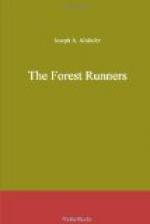That day came, cloudless and brilliant above, but to the accompaniment of shouts, shots, and alarms below. Once more the terrible march was resumed, and the savages still hung mercilessly on their flanks. Henry, with anxious heart, noticed a waning of spirit, though not of courage, in the train. The raw nerves grew rawer. This incessant marching forward between the very walls of death could not be endured forever. Again he sought a way out. Such a way they must have, and at last he believed that he had found it. But he said nothing at present, and the train, edged on either side with fire and smoke, went on through the woods.
A third time they camped in an open space, a third time they fortified; but now, after the supper was over, Henry called a council of the leaders.
“We cannot go on as we have been going,” he said. “The savages hang to us with uncommon tenacity, and there are limits to human endurance.”
Daniel Poe shook his head sadly. The awful lacerating process had never ceased. More men were wounded, and the spirits of all grew heavier and heavier. Paul still walked among the fires, seeking to cheer and inspire, but he could do little. Dread oppressed the women and children, and they sat mostly in silence. Outside, an occasional whoop came from the depths of the forest, and now and then a rifle was fired. The night was coming on, thick and ominous. The air had been heavy all the day, and now somber clouds were rolling across the sky. At intervals flashes of lightning flared low down on the black forest. Heavy and somber, like the skies, were the spirits of all the people. A wounded horse neighed shrilly, and in an almost human voice, as he died.
“We must take a new step,” said Henry; “things cannot go on this way. It is yet a hundred and fifty miles, perhaps, to Wareville, and if the savages continue to hang on, we can never reach it.”
“What do you propose?” asked Daniel Poe.
Henry Ware stood erect. The light of the council fire flared upon his splendid, indomitable face. All relied upon him, and he knew it.
“I have a plan,” he said. “To-morrow we can reach an unforested hill that I know of, with a spring flowing out of the side. It is easy to hold, and we shall have plenty of water. We will stop there and make our stand. Meanwhile, we will send to Wareville for help. The messenger must leave to-night. Jim Hart, are you ready?”
Jim Hart had been sitting on a fallen tree, all humped together. Now he unfolded himself and stood up, stretched out to his complete length, six feet four inches of long, slim man, knotted and jointed, but as tough as wire—the swiftest runner in all the West. Long Jim, ugly, honest, and brave, said nothing, but his movement showed that he was ready.
“Jim Hart was made for speed,” continued Henry. “At his best he is like the wind, and he can run all the way to Wareville. He’ll leave in a half hour, before the moon has a chance to rise.”




